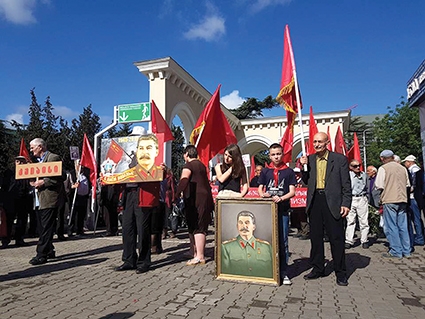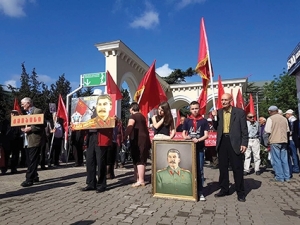The Banning of Soviet Symbols in Georgia
Totalitarian communist and fascist symbols are banned at the legislative level in Georgia. The Liberty Charter, adopted in 2011, bans public display of Soviet and Nazi symbols, including statues or photos of the former Soviet leader and native Georgian, Joseph Stalin.
The Charter, among other issues, also envisages the creation of a state commission at the Interior Ministry in charge of gathering information about the existence of symbols, monuments, statues, inscriptions, and the names of streets or squares that reflect or contain “elements of communist or fascist ideology and propaganda.”
The law does not apply to private individuals, but it establishes that the use of Soviet totalitarian symbols cannot be used on state and local self-government buildings, squares and streets. Also, the use of these symbols is prohibited at public gatherings and public places.
Georgia was the first post-Soviet country outside of the Baltics to ban former KGB operatives and senior Communist Party officials from holding public office. They are also prohibited from serving as university deans or judges.
“A Commission shall be established within the State Security Service of Georgia for the purpose of preventing the crimes referred to in Chapter XXXVIII of the Criminal Code of Georgia and for ensuring state security and the development of democracy and for registering and accepting acknowledgements and providing a database of former secret agents of the intelligence services of the former USSR and other state officials referred to in this Law, as well as for the purpose of prohibiting totalitarian Communist and national socialist (Nazi) regimes and their propaganda and for other purposes referred to in this Law,” says Article 7 of the Freedom Charter. “The factions represented in the Parliament of Georgia shall be granted the right to propose one candidate to the Commission. The composition of the Commission (except for members proposed by the factions represented in the Parliament of Georgia) and its Code of Conduct shall be set out in regulations developed and approved by the head of the State Security Service of Georgia.”
In late 2013, the Charter was amended, according to which if, after a warning from the state commission, this provision, banning the public display of such symbols, is still violated, the action will carry a financial penalty of GEL 1000.
Despite officially banning totalitarian symbols, the law is said not to be properly executed. For example, the State Security Service (SSS) warned Socialist Georgia party representatives not to use Soviet symbols while celebrating the Day of Victory over fascism on May 9, 2018. However, the party representatives arrived in central Tbilisi's Vake Park with Soviet flags, various symbols and Stalin’s photos.
“Communist and Socialist movements are not banned anywhere; no international law or tribunal has prohibited Communist ideals and symbols. The Parliament of Georgia has no right to ban these symbols,” Valery Kvaratskhelia, the party leader stated.
Moreover, in Stalin’s hometown Gori, located in central Georgia, locals brought Stalin’s bust into the central square, where a 9-meter statue of him once stood, until 2010, when, on the government’s orders, the statue was dismantled in secret, late at night, in order to avoid the protests.
Neither Socialist party nor the Gori locals were fined by the SSS on May 9.
Nino Burjanadze, the leader of Democratic Georgia non-parliamentary opposition party, often affiliated with Russia, believes Soviet symbols should not be banned.
According to her, in World War II, Georgian soldiers fought with Soviet symbols and the state should not eradicate them.
“Half the world fought against the Nazis with Soviet symbols. Instead of banning them, the state should concentrate on today’s problems and stop acting like fools,” Burjanadze stated.
By Thea Morrison












